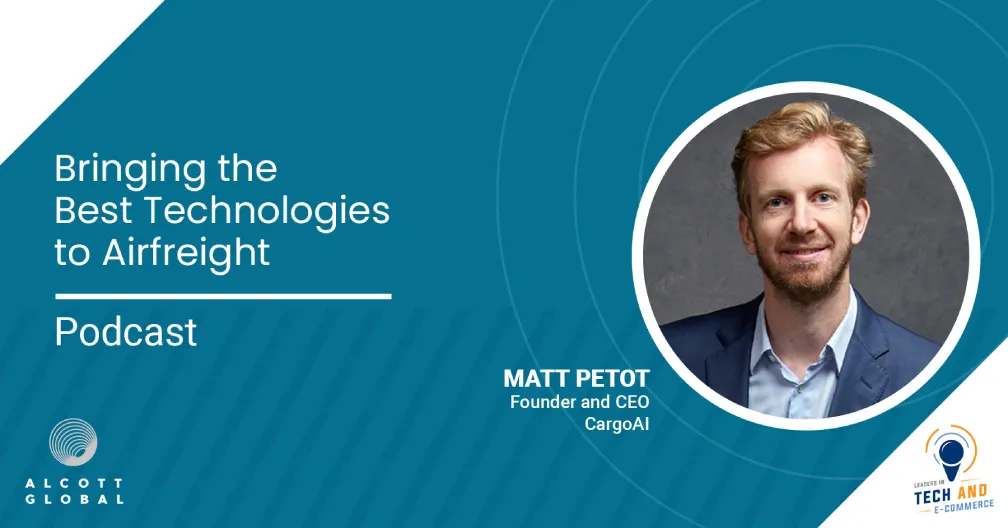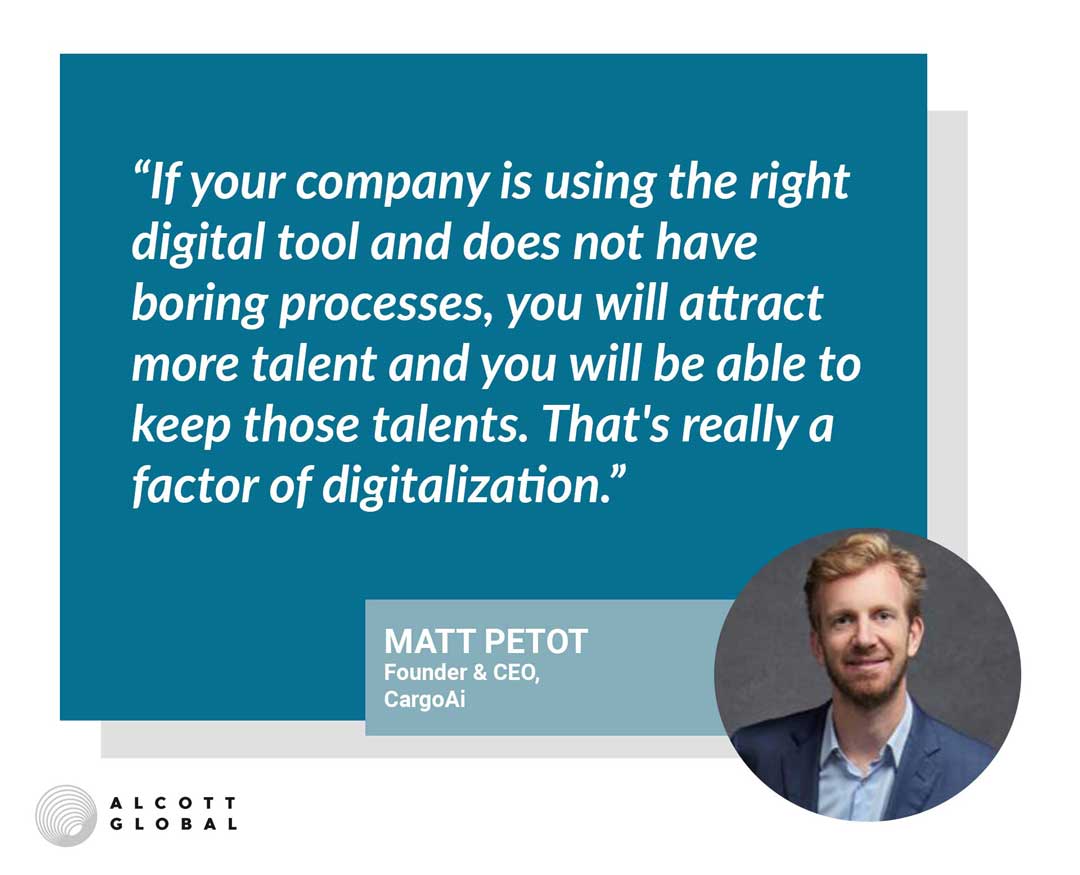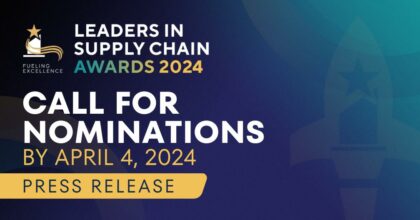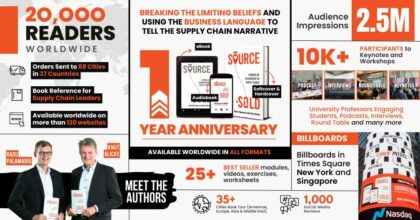Matt Petot is the Founder and CEO of CargoAI. He is a creative and out-of-the-box thinker, pragmatic and proactive, has strong leadership, and team management, has good communication abilities, result driven mindset, fast learner, is multicultural and a team player, and is well-organized.
He also has experience in analytics, operations performance improvement, and global business strategy.
Listen to the full discussion here:
- Listen on Stitcher
Connect with the Guest:
Matt Petot: LinkedIn
Some of the highlights from the podcast:
- How did Matt start his journey as an entrepreneur and ending up with air cargo
- What is the difference between Air Freight and Sea Freight
- The upside of air cargo due to the pandemic
- CargoAI for the next 5 to 10 years
- Solutions related to carbon neutralizing
- Keeping up with the team’s mental health
Show notes:
- [0:55] You had a very successful career with Dyson, what made you leave that cushy job and start being an entrepreneur?
- [1:34] I left five years ago and took a sabbatical with my family around the world. And when I came back, I decided to be an entrepreneur which led me to air cargo.
- [2:00] Why did you end up starting air cargo and nothing else?
- [3:13] It strikes me that this industry has really been operating on its own alone, without all the progress that has been done in most of the other industries. So that’s why I started this CargoAI to really bring cargo to the industry to bring technology.
- [4:06] Why do you think part of the business grew quickly because cargo was always a profitable business?
- [4:21] The reason why, is because I think cargo is concrete, even if it belongs to the same airline group, or it’s still a totally different business unit and it’s different people.
- [9:02] Do cargos provide a solution where you can now do LTL, you can have five different partners going into the same plane from one route, let’s say Asia to US or Asia to Europe.
- [11:21] Let’s say I’m running a vision care product. I’m basically spending $2 million on air freight because you know, it’s an optical lens and has to move faster. I’d rather cut the cost, go directly look at the capacity and directly reach out to airlines. So why wouldn’t they have access to your marketplace? Why are they not using it?
- [11:42] That’s not possible in air cargo, you need to go through a freight forwarder because they will do much more than just book the cargo online, they will also arrange the directions, they will make sure you have the customs clearance properly done, they will create the pallets which need to be specific for the cargo because it is much riskier than sea freight.
- [13:03] What’s happening with the cost of air freight? Can you tell us if the price is going to fall or rise in the next six months because we are seeing a trend in sea freight at least that it’s been going down now?
- [13:16] It’s the same with air freight, it’s going down now. I can’t really predict more than what visibility cargo is booked in the next two weeks. So you don’t really see more than two weeks of actual data.
- [15:02] Is there any other upside that you got through the pandemic?
- [16:36] What do you think the landscape is going to look like for CargoAi in the next five to 10 years?
- [16:47] There is a ton of stuff to do. And right now, there is not a lot of company that is expert as we are in cargo and digitalization. So we have really enough focus to build a team with half of the team being very expert in product and technology.
- [18:39] How are you talking about sustainability in the company? Is it one of the topics you have in mind while building the organization or is it something that you have kind of picked up right now because it’s higher in trend and demand?
- [18:52] Basically, we are a young company, and we have a lot of young people. It’s almost like a no-brainer, and a must for all of us in the company. So we have to play our parts and see how we can do something at the same time.
- [21:14] What are the ways of carbon neutralizing?
- [22:09] The best way to reduce is really the main sustainable aviation fuel is the undisputed way to reduce your carbon. So yes, it’s a bit expensive. But today, it’s the undisputed way.
- [23:11] What leadership skills do you think you had, that made CargoAI what it is now?
- [23:21] To be honest, I think there was a big timing, and it’s not only my leadership, but it was running at the right time with the right skills and knowledge from my side.
- [25:17] How do you keep up with your mental health? And how do you make sure that you’re creating a culture to identify gaps if somebody’s mentally falling low?
- [26:29] So what we implemented, which I think is quite good is less this year, we did social cargo what we call and so everybody can spend $50 every month on a social activity with their friends, family, or sport, fitness or anything and they have to post it and that’s really to ensure that people will go out as you can.
Quote from the Episode:
Soundbite from the Episode:
About the Host:
The host, Rushit Shah is the Managing Director of APAC and North America at Alcott Global. Rushit comes with 20 years of Executive Search and Selection with 8 years of Supply Chain Consulting service within APAC. He worked for more than 40 countries with diversified industries and functionality.
Alcott Global connects and upgrades the supply chain ecosystem by finding the right talent through executive search, developing talent through learning solutions, and meeting supply chain technology needs through a comprehensive crunch base marketplace.
The supply chain executive search has been our focus since the very beginning, offering recruitment services for top-tier supply chain roles at every level of the end-to-end supply chain: plan, source / procure, make, and deliver. Our consultants have years of experience in placing top talent, in North America, LATAM, Europe, the Middle East & Africa, and APAC, and besides speed, one of our biggest strengths is our network within the supply chain industry, and we capitalize on it to find the best solutions.
Through the years, we have grown as an organization and our offerings with it. One of our initiatives, the learning solutions- training and supply chain academy, is focused on transforming leadership- self-leadership, executive presence, influence capital, and business acumen. Through Supplify, we aim to match corporations with the top technology companies to solve their supply chain and logistics challenges with a focus on innovation and digital transformation.
We are in constant touch with the leaders in supply chain, inviting them to inspire the supply chain professionals in thought-provoking podcast episodes and events, and showcasing what is possible at the yearly Leaders in Supply Chain Awards.
Related Episodes:
Sustainability Offsetting within the Logistics Sector
Bringing Transportation in Sync with the World
Succeed in the E-commerce Market Through Innovative Solutions









